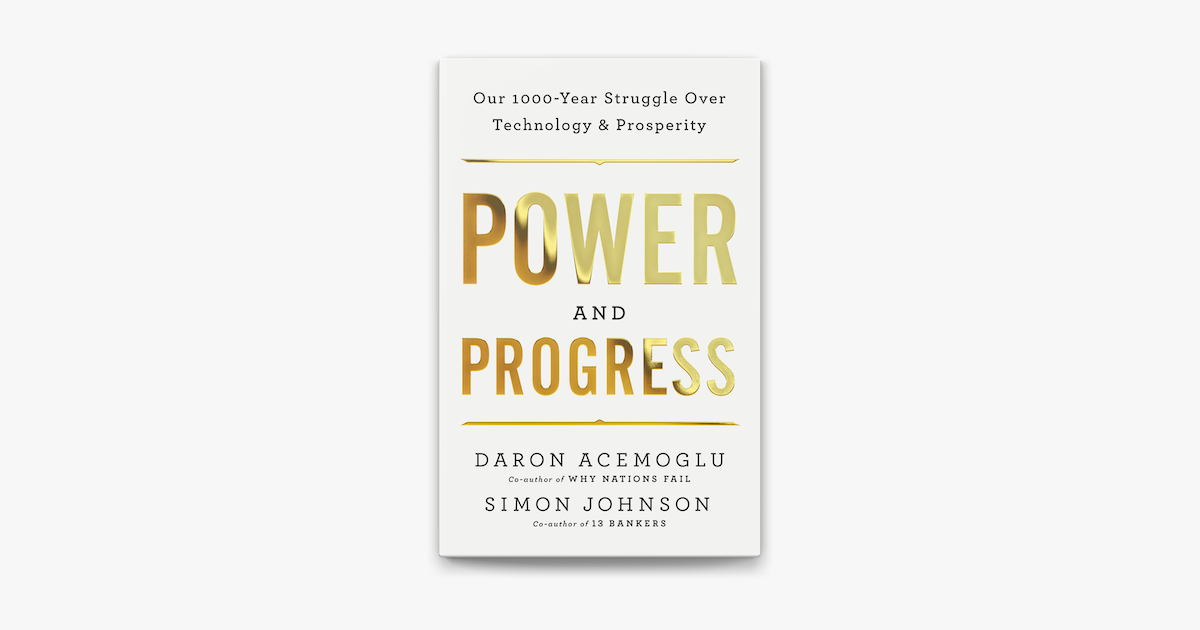Power and Progress: Our Thousand-Year Struggle Over Technology and Prosperity

는 다론 아제모을루와 사이먼 존슨이 기술 발전이 역사적으로 사회 번영과 권력 구조에 어떻게 영향을 미쳤는지를 분석한 책입니다. 저자들은 기술이 본질적으로 모두에게 이익을 주는 것이 아니라, 의도적인 노력이 없다면 부와 권력이 소수 엘리트에게 집중된다고 주장합니다. 주요 내용을 요약하면 다음과 같습니다.
핵심 주제
- 기술의 이중적 성격:
- 기술은 진보와 경제 성장을 촉진할 수 있지만, 동시에 불평등을 심화시킬 위험이 있습니다.
- 제도적 통제가 없다면 기술 발전은 노동자와 소외 계층에 피해를 주고 엘리트에게만 혜택을 줄 수 있습니다.
- 역사적 맥락:
- 중세 유럽: 농업 기술 발전은 생산성을 높였지만, 주로 지주와 엘리트들이 이익을 챙겼으며 농민들의 삶은 개선되지 않았습니다.
- 산업혁명: 초기 산업 기술은 노동자를 대체하고 열악한 노동 환경을 조성했습니다. 노동 운동과 정치적 개혁을 통해서야 비로소 전반적인 번영이 가능해졌습니다.
- 현대적 도전 과제:
- 디지털 혁명과 AI 기술은 생산성을 높였지만, 주로 기술 기업과 그 지도자들에게 혜택이 집중되고 있습니다.
- 자동화는 일자리를 대체하면서도 충분한 새로운 기회를 창출하지 못해 경제적 불평등을 심화시킬 가능성이 있습니다.
- 제도의 역할:
- 포괄적인 정치 및 경제 제도는 기술 발전이 사회 전체에 혜택을 미칠 수 있도록 하는 데 핵심적입니다.
- 규제 체계, 진보적 과세, 교육 및 노동 시장 적응을 촉진하는 정책이 필요합니다.
- 기술 발전 방향의 중요성:
- 기술은 본질적으로 중립적이지 않으며, 사회적 우선순위와 권력 구조를 반영합니다.
- 노동을 대체하기보다 보완하는 기술을 우선시함으로써 더 공정한 성장을 이룰 수 있습니다.
더 나은 미래를 위한 제안
- 기술의 재정향:
- 노동자를 대체하기보다 노동을 강화하고 지원하는 기술을 개발해야 합니다.
- 사회적 복지에 기여하는 기술 혁신, 예를 들어 청정에너지와 공공 건강 기술을 우선시해야 합니다.
- 제도 강화:
- 정부는 기술 발전이 공정하게 혜택을 나눌 수 있도록 적극적인 역할을 해야 합니다.
- 기본소득, 노동 보호, 더 강력한 반독점 조치 같은 정책이 필수적입니다.
- 민주적 감독:
- 기술 발전의 방향에 대한 결정 과정에 대중의 참여를 확대해야 합니다.
- AI와 자동화 기술 개발은 사회적 해악을 피하기 위해 윤리적 고려가 필수적입니다.
결론
아제모을루와 존슨은 기술이 자동으로 진보를 보장하지 않으며, 기술의 혜택을 공정하게 분배하려면 의도적이고 제도적인 노력이 필요하다고 주장합니다. 기술 발전을 포괄적인 제도를 통해 민주적으로 통제하고, 인류 복지를 우선시하는 정책을 통해 보다 공정한 미래를 만들어야 한다는 메시지를 전달합니다.
Power and Progress: Our Thousand-Year Struggle Over Technology and Prosperity by Daron Acemoglu and Simon Johnson examines how technological advancements throughout history have influenced societal prosperity and power dynamics. The authors argue that technology’s benefits are not inherently distributed evenly, often concentrating power and wealth among elites unless there are deliberate efforts to share the gains equitably. Here's a summary of its key points:
Key Themes
- The Dual Nature of Technology:
- Technology can drive progress and economic growth, but it often exacerbates inequality by concentrating wealth and power in the hands of a few.
- Without institutional checks, technological advances can harm workers and marginalized groups while benefiting elites.
- Historical Context:
- Medieval Europe: Agricultural advancements increased productivity but primarily enriched landlords and elites rather than improving the lives of peasants.
- Industrial Revolution: Early industrial technologies displaced workers and created harsh labor conditions. Only with labor movements and political reforms did widespread prosperity emerge.
- Modern Challenges:
- Today’s digital revolution and AI advancements have increased productivity but often at the expense of labor, with significant rewards going to tech companies and their leaders.
- Automation, for example, risks widening economic disparities by replacing jobs without creating sufficient new opportunities.
- The Role of Institutions:
- Inclusive political and economic institutions are critical to ensuring that technological advancements benefit society broadly rather than reinforcing existing inequalities.
- Examples include regulatory frameworks, progressive taxation, and policies that promote education and labor market adaptability.
- The Importance of Directionality:
- Technology is not inherently neutral; its development reflects societal priorities and power structures.
- By prioritizing technologies that complement human labor rather than replacing it, societies can create more equitable growth.
Proposals for a Better Future
- Reorienting Technology:
- Develop technologies that empower workers rather than displacing them.
- Promote innovation that serves societal well-being, such as clean energy and public health.
- Strengthening Institutions:
- Governments should play an active role in guiding technological development to ensure equitable benefits.
- Policies like universal basic income, labor protections, and stronger antitrust measures are essential to counteract monopolistic tendencies.
- Democratic Oversight:
- Broader public participation in decisions about technology’s direction is needed to prevent elite capture of its benefits.
- Ethical considerations must guide AI and automation development to avoid societal harm.
Conclusion
Acemoglu and Johnson argue that technology alone does not guarantee progress; it requires deliberate efforts to distribute its benefits equitably. Societies must actively shape technological advancement through inclusive institutions, democratic oversight, and policies that prioritize human welfare over elite interests. The book serves as both a critique of the current trajectory of technological development and a call to action for creating a more equitable future.
'아무거나' 카테고리의 다른 글
| 식기세척기 활용법: 한국식 식기 관리 & 주의사항 (0) | 2026.01.13 |
|---|---|
| 깔끔한 집의 비밀: NEAT METHOD 대표 젠 로우가 알려주는 정리의 기술 (0) | 2025.11.02 |
| 포터블 에어컨 설치 (0) | 2023.05.18 |
| 라면 먹고 자면 왜 다음날 얼굴이 부을까? (0) | 2023.03.20 |
| 수원종합버스터미널에서 세종고속시외버스터미널 가는 시외버스 시간표 (0) | 2023.02.01 |